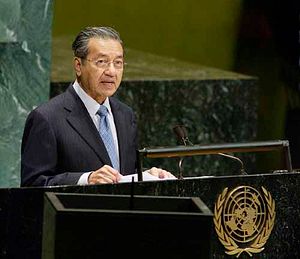On Wednesday, reports surfaced that India had imposed what amounted to an effective ban on refined palm oil targeting Malaysia following an ongoing diplomatic row between the two countries set off by the Kashmir issue. The development has highlighted one of a series of complicating factors in relations between the two Asian states.
Strategically, the relationship between India and Malaysia has been on the uptick in recent years despite occasional differences that have surfaced on issues such as trade, with ties elevated to an enhanced strategic partnership in 2015 under Prime Minister Narendra Modi’s “Act East Policy” and the former Malaysian government under Prime Minister Najib Razak. But then the Pakatan Harapan government came to power in a shock election in May 2018. As Malaysian foreign policy developed under returning premier Mahathir Mohamad there had been indications of differences emerging in aspects of Malaysia-India relations, including increased engagement with Pakistan and the refusal to extradite controversial Islamic preacher Zakir Naik to India.
As I have noted before in The Diplomat Magazine, the biggest flare up in Malaysia-India ties came following Mahathir’s remarks on the Kashmir issue in his remarks to the United Nations last September. In his address at the 74th session of the UN General Assembly on September 27, Mahathir suggested that New Delhi had “invaded and occupied” Jammu and Kashmir, a disputed Muslim-majority region also claimed by Pakistan. India had made the controversial move of stripping its portion of the Kashmir Valley of statehood and autonomy in August. Despite initial indications of Indian discontent – including a statement from the foreign ministry and suggestions of economic restrictions – and comments from Malaysian officials that both sides were managing the issue, Mahathir himself had refused to retract his comments.
This week, we saw another indication of the continued significance of the Kashmir dispute in Malaysia-India relations. Following mulled restrictions that had surfaced earlier, India issued what amounted to an effective ban on imports of refined palm oil in a move intended to target Malaysia following the dispute.
India’s Ministry of Commerce and Industry issued a notification on Wednesday noting that the import of refined palm oil had been amended from “free” to “restricted,” the clearest indication thus far from the Indian government of restrictions in this area. Reuters reported that multiple anonymous sources had mentioned that the notification amounted to an effective ban on imports of refined palm oil in an effort by the Modi government to target Malaysia following Mahathir’s comments.
How exactly this will affect the overall bilateral relationship remains to be seen. At the time of writing, we have yet to see an official high-level reaction from either government. And even thereafter, the specific economic impact and the wider consequences for ties will only become clear with time, more details, and reactions from both sides.
But the development is not without significance if it concretizes as expected. Malaysia is the world’s second largest producer and exporter of palm oil after Indonesia, with the product accounting for just under 3 percent of Malaysia’s entire GDP. India is Malaysia’s third-largest export destination for palm oil. An effective ban on refined palm oil is a big hit for Malaysia since it is the main supplier of refined palm oil to India. Meanwhile, India will retain the ability to continue importing – and perhaps even importing more of – crude palm oil, which Indonesia is the leading exporter of.
While there may still be room for both countries to eventually manage this issue over time, the fact that no resolution has occurred up to this point does not bode well for ties. Malaysia had reportedly previously been considering a series of conciliatory moves — including raising imports of Indian products to ease trade tensions and appointing a special envoy to India to shore up economic relations — but the time may have passed for such measures now. More generally, Malaysia will find it difficult to back down entirely not just because of the morality of the Kashmir position Mahathir referred to, but also because the PH government has been focused on defending palm oil against Western resistance as a foreign policy issue.
The saving grace at this point might be that we have yet to see public indications of this spilling over and negatively affecting other areas of bilateral relations including culture or defense. Nonetheless, that tensions have gotten this far should be concerning for both countries. For Malaysia, it is a vivid demonstration that Mahathir’s moralistic rhetoric can have real costs for Malaysia’s economy. And for India, it is a reminder that its approach to Kashmir poses complications not only for its domestic politics or alignments with Western countries, but also for select Muslim-majority countries in Asia like Malaysia who are outspoken on these issues. Without some adjustment on both sides, we could see more points of friction emerge in the coming months and years even if the logic of broader strategic collaboration remains clear.

































